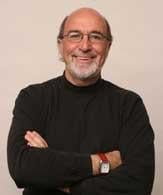Author and creativity guru Sam Harrison discusses how curiosity and perseverance can keep the ideas flowing.
If you ever have the chance to hear Sam Harrison speak at an industry event, by all means, take advantage. Sam's curiosity about his own creative process has led him to focus his career on researching creativity and writing and talking about the ways we develop ideas. He inspires creative pros to keep their mental muscles toned and helps them successfully pitch their ideas to colleagues and clients. (Plus, he's one of the nicest, smartest people you'll encounter.)
I recently chatted with my friend Sam about how to maintain creativity – especially in the face of long-term projects.
First, by way of introduction, give us a few words that describe the work that you do?
I can name that tune in six words: Help people expand and express creativity.
 |
| Sam Harrison |
Tell us a little about what you did before becoming a speaker, author, columnist and all-around expert on creativity.
I spent years in product development, branding and marketing. I partnered with organizations like the NFL, Major League Baseball, American Express, Hallmark, Hasbro and John Denver environmental groups. About 10 years ago, I reached a place professionally and financially where I had the freedom to consider other creative paths, including the writing and speaking that keeps me busy these days.
As a creative pro yourself, you no doubt have to practice what you preach about maintaining your creativity. What are the things you do to keep your mojo working?
If I had to distill it down to one word, it would be curiosity. Being curious is jet fuel for inspiration. I've interviewed and worked with scores of highly creative people, and they all have this common denominator of curiosity.
Ideas don't normally come zooming into our heads from "out there" – they are internal responses to our encounters and interactions with people and events. It's more important to learn something than prove something. When I'm focused on learning rather than showing how much I know, my mojo flourishes!
You and I have talked in the past about how our parents never let us get away with being bored as kids. Do you think that contributed to your creativity?
Absolutely. When I whined about being bored, my mother would say, "Good, that means you get to discover something to do." And she would say, "Bored people are boring people. They don't have enough imagination to entertain themselves, no less the rest of us." Those words stuck.
It's not that creative people don't get bored. But they don't sit in boredom; they let that boredom trigger them to find something to do or create.
When we're facing a long-term project, and we anticipate that it might sap our creativity along the way, are there things we can do up front to help keep the momentum going and avoid lulls?
One thing I'll do at the start of a lengthy project is find a book to read about someone overcoming major challenges to accomplish goals. For example, while writing one book, I read Devil in the White City by Erik Larson, which is partly about Daniel Burnham's relentless drive to build the 1893 World's Fair. Those books offer escape and inspiration. I'll also look at the project schedule and build in several intermissions, celebrations and micro-vacations.
Finally, I try to stay curious and ask questions. In the middle of a long project, I'll sometimes think, "Damn, I'm sick of this and can't do it another day." But after a few minutes of self-pity, I'll force myself to ask lots of questions about the project. I search for a new slant, a new pair of glasses. As John Cage used to say, I try to become unfamiliar with what I'm doing to renew creative energy.






